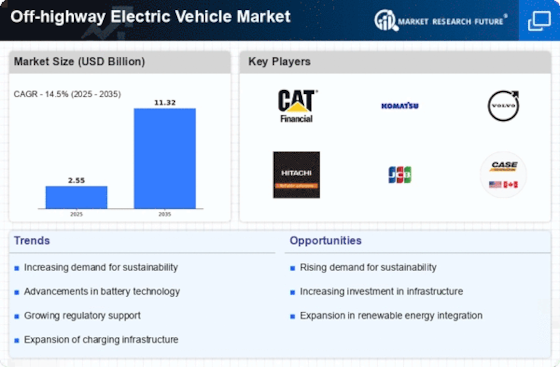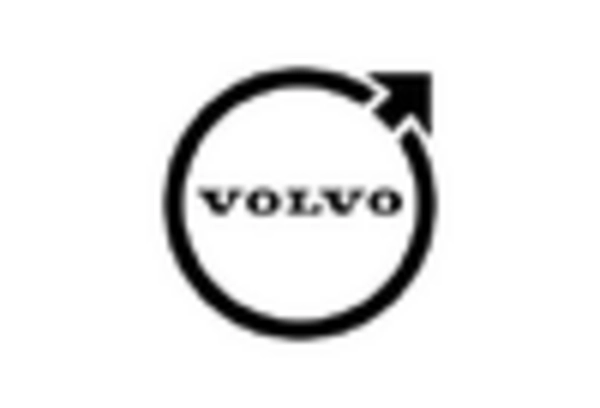-
EXECUTIVE SUMMARY
-
MARKET INTRODUCTION
-
Definition
-
Scope of the Study
- Research Objective
- Assumptions
- Limitations
-
RESEARCH METHODOLOGY
-
Overview
-
Data Mining
-
Secondary Research
-
Primary Research
- Primary Interviews and Information Gathering Process
- Breakdown of Primary Respondents
-
Forecasting Modality
-
Market Size Estimation
- Bottom-Up Approach
- Top-Down Approach
-
Data Triangulation
-
Validation
-
MARKET DYNAMICS
-
Overview
-
Drivers
-
Restraints
-
Opportunities
-
MARKET FACTOR ANALYSIS
-
Value Chain Analysis
-
Porter’s Five Forces Analysis
- Bargaining Power of Suppliers
- Bargaining Power of Buyers
- Threat of New Entrants
- Threat of Substitutes
- Intensity of Rivalry
-
COVID-19 Impact Analysis
- Market Impact Analysis
- Regional Impact
- Opportunity and Threat Analysis
-
Off highway Electric Vehicle Market, BY VEHICLE TYPE
-
Overview
-
HEV
-
BEV
-
Off highway Electric Vehicle Market, BY ENERGY STORAGE CAPACITY
-
Overview
-
200 kWh
-
Off highway Electric Vehicle Market, BY BATTERY TYPE
-
Overview
-
Lithium-Ion (Li-Ion)
-
Lead–Acid
-
Off highway Electric Vehicle Market, BY APPLICATION
-
Overview
-
Mining
-
Construction
-
Agriculture
-
Others
-
Off highway Electric Vehicle Market, BY REGION
-
Overview
-
North America
- U.S.
- Canada
-
Europe
- Germany
- France
- U.K
- Italy
- Spain
- Rest of Europe
-
Asia-Pacific
- China
- India
- Japan
- South Korea
- Australia
- Rest of Asia-Pacific
-
Rest of the World
- Middle East
- Africa
- Latin America
-
COMPETITIVE LANDSCAPE
-
Overview
-
Competitive Analysis
-
Market Share Analysis
-
Major Growth Strategy in the Global Off-highway Electric Vehicle Market,
-
Competitive Benchmarking
-
Leading Players in Terms of Number of Developments in the Global Off-highway Electric Vehicle Market,
-
Key developments and Growth Strategies
- New Vehicle Type Launch/Type Battery Type
- Merger & Acquisitions
- Joint Ventures
-
Major Players Financial Matrix
- Sales & Operating Income, 2022
- Major Players R&D Expenditure. 2022
-
COMPANY PROFILES
-
LIEBHERR-INTERNATIONAL DEUTSCHLAND GMBH
- Company Overview
- Financial Overview
- Vehicle Types Offered
- Key Developments
- SWOT Analysis
- Key Strategies
-
Cargotec corporation
- Company Overview
- Financial Overview
- Vehicle Types Offered
- Key Developments
- SWOT Analysis
- Key Strategies
-
CLARK.
- Company Overview
- Financial Overview
- Vehicle Types Offered
- Key Developments
- SWOT Analysis
- Key Strategies
-
CNH Industrial
- Company Overview
- Financial Overview
- Vehicle Types Offered
- Key Developments
- SWOT Analysis
- Key Strategies
-
Narrow Isle inc..
- Company Overview
- Financial Overview
- Vehicle Types Offered
- Key Developments
- SWOT Analysis
- Key Strategies
-
TOYOTA MOTOR CORPORATION.
- Company Overview
- Financial Overview
- Vehicle Types Offered
- Key Developments
- SWOT Analysis
- Key Strategies
-
SANY Group
- Company Overview
- Financial Overview
- Vehicle Types Offered
- Key Developments
- SWOT Analysis
- Key Strategies
-
Sandvik.
- Company Overview
- Financial Overview
- Vehicle Types Offered
- Key Developments
- SWOT Analysis
- Key Strategies
-
Epiroc.
- Company Overview
- Financial Overview
- Vehicle Types Offered
- Key Developments
- SWOT Analysis
- Key Strategies
-
Caterpillar
- Company Overview
- Financial Overview
- Vehicle Types Offered
- Key Developments
- SWOT Analysis
- Key Strategies
-
Komatsu Ltd..
- Company Overview
- Financial Overview
- Vehicle Types Offered
- Key Developments
- SWOT Analysis
- Key Strategies
-
Hitachi Construction Machinery.
- Company Overview
- Financial Overview
- Vehicle Types Offered
- Key Developments
- SWOT Analysis
- Key Strategies
-
DEERE & COMPANY.
- Company Overview
- Financial Overview
- Vehicle Types Offered
- Key Developments
- SWOT Analysis
- Key Strategies
-
JCB.
- Company Overview
- Financial Overview
- Vehicle Types Offered
- Key Developments
- SWOT Analysis
- Key Strategies
-
AB Volvo.
- Company Overview
- Financial Overview
- Vehicle Types Offered
- Key Developments
- SWOT Analysis
- Key Strategies
-
Anhui Heli Co., Ltd..
- Company Overview
- Financial Overview
- Vehicle Types Offered
- Key Developments
- SWOT Analysis
- Key Strategies
-
Hyundai Doosan Infracore Co. Ltd.
- Company Overview
- Financial Overview
- Vehicle Types Offered
- Key Developments
- SWOT Analysis
- Key Strategies
-
APPENDIX
-
References
-
Related Reports
-
-
LIST OF TABLES
-
GLOBAL OFF-HIGHWAY ELECTRIC VEHICLE MARKET, SYNOPSIS, 2018-2032
-
GLOBAL OFF-HIGHWAY ELECTRIC VEHICLE MARKET, ESTIMATES & FORECAST, 2018-2032 (USD BILLION)
-
Off highway Electric Vehicle Market, BY VEHICLE TYPE, 2018-2032 (USD BILLION)
-
Off highway Electric Vehicle Market, BY ENERGY STORAGE CAPACITY, 2018-2032 (USD BILLION)
-
Off highway Electric Vehicle Market, BY BATTERY TYPE, 2018-2032 (USD BILLION)
-
Off highway Electric Vehicle Market, BY APPLICATION, 2018-2032 (USD BILLION)
-
Off highway Electric Vehicle Market, BY VEHICLE TYPE, 2018-2032 (USD BILLION)
-
Off highway Electric Vehicle Market, BY ENERGY STORAGE CAPACITY, 2018-2032 (USD BILLION)
-
Off highway Electric Vehicle Market, BY BATTERY TYPE, 2018-2032 (USD BILLION)
-
Off highway Electric Vehicle Market, BY APPLICATION, 2018-2032 (USD BILLION)
-
Off highway Electric Vehicle Market, BY COUNTRY, 2018-2032 (USD BILLION)
-
U.S. Off highway Electric Vehicle Market, BY VEHICLE TYPE, 2018-2032 (USD BILLION)
-
U.S. Off highway Electric Vehicle Market, BY ENERGY STORAGE CAPACITY, 2018-2032 (USD BILLION)
-
U.S. Off highway Electric Vehicle Market, BY BATTERY TYPE, 2018-2032 (USD BILLION)
-
U.S. Off highway Electric Vehicle Market, BY APPLICATION, 2018-2032 (USD BILLION)
-
Off highway Electric Vehicle Market, BY VEHICLE TYPE, 2018-2032 (USD BILLION)
-
Off highway Electric Vehicle Market, BY ENERGY STORAGE CAPACITY, 2018-2032 (USD BILLION)
-
Off highway Electric Vehicle Market, BY BATTERY TYPE, 2018-2032 (USD BILLION)
-
Off highway Electric Vehicle Market, BY APPLICATION, 2018-2032 (USD BILLION)
-
Off highway Electric Vehicle Market, BY VEHICLE TYPE, 2018-2032 (USD BILLION)
-
Off highway Electric Vehicle Market, BY ENERGY STORAGE CAPACITY, 2018-2032 (USD BILLION)
-
Off highway Electric Vehicle Market, BY BATTERY TYPE, 2018-2032 (USD BILLION)
-
Off highway Electric Vehicle Market, BY APPLICATION, 2018-2032 (USD BILLION)
-
Off highway Electric Vehicle Market, BY COUNTRY, 2018-2032 (USD BILLION)
-
Off highway Electric Vehicle Market, BY VEHICLE TYPE, 2018-2032 (USD BILLION)
-
Off highway Electric Vehicle Market, BY ENERGY STORAGE CAPACITY, 2018-2032 (USD BILLION)
-
Off highway Electric Vehicle Market, BY BATTERY TYPE, 2018-2032 (USD BILLION)
-
Off highway Electric Vehicle Market, BY APPLICATION, 2018-2032 (USD BILLION)
-
Off highway Electric Vehicle Market, BY VEHICLE TYPE, 2018-2032 (USD BILLION)
-
Off highway Electric Vehicle Market, BY ENERGY STORAGE CAPACITY, 2018-2032 (USD BILLION)
-
Off highway Electric Vehicle Market, BY BATTERY TYPE, 2018-2032 (USD BILLION)
-
Off highway Electric Vehicle Market, BY APPLICATION, 2018-2032 (USD BILLION)
-
Off highway Electric Vehicle Market, BY VEHICLE TYPE, 2018-2032 (USD BILLION)
-
Off highway Electric Vehicle Market, BY ENERGY STORAGE CAPACITY, 2018-2032 (USD BILLION)
-
Off highway Electric Vehicle Market, BY BATTERY TYPE, 2018-2032 (USD BILLION)
-
Off highway Electric Vehicle Market, BY APPLICATION, 2018-2032 (USD BILLION)
-
Off highway Electric Vehicle Market, BY VEHICLE TYPE, 2018-2032 (USD BILLION)
-
Off highway Electric Vehicle Market, BY ENERGY STORAGE CAPACITY, 2018-2032 (USD BILLION)
-
Off highway Electric Vehicle Market, BY BATTERY TYPE, 2018-2032 (USD BILLION)
-
Off highway Electric Vehicle Market, BY APPLICATION, 2018-2032 (USD BILLION)
-
U.Off highway Electric Vehicle Market, BY VEHICLE TYPE, 2018-2032 (USD BILLION)
-
U.Off highway Electric Vehicle Market, BY ENERGY STORAGE CAPACITY, 2018-2032 (USD BILLION)
-
U.Off highway Electric Vehicle Market, BY BATTERY TYPE, 2018-2032 (USD BILLION)
-
U.Off highway Electric Vehicle Market, BY APPLICATION, 2018-2032 (USD BILLION)
-
Off highway Electric Vehicle Market, BY VEHICLE TYPE, 2018-2032 (USD BILLION)
-
Off highway Electric Vehicle Market, BY ENERGY STORAGE CAPACITY, 2018-2032 (USD BILLION)
-
Off highway Electric Vehicle Market, BY BATTERY TYPE, 2018-2032 (USD BILLION)
-
Off highway Electric Vehicle Market, BY APPLICATION, 2018-2032 (USD BILLION)
-
Off highway Electric Vehicle Market, BY VEHICLE TYPE, 2018-2032 (USD BILLION)
-
Off highway Electric Vehicle Market, BY ENERGY STORAGE CAPACITY, 2018-2032 (USD BILLION)
-
Off highway Electric Vehicle Market, BY BATTERY TYPE, 2018-2032 (USD BILLION)
-
Off highway Electric Vehicle Market, BY APPLICATION, 2018-2032 (USD BILLION)
-
Off highway Electric Vehicle Market, BY COUNTRY, 2018-2032 (USD BILLION)
-
Off highway Electric Vehicle Market, BY VEHICLE TYPE, 2018-2032 (USD BILLION)
-
Off highway Electric Vehicle Market, BY ENERGY STORAGE CAPACITY, 2018-2032 (USD BILLION)
-
Off highway Electric Vehicle Market, BY BATTERY TYPE, 2018-2032 (USD BILLION)
-
Off highway Electric Vehicle Market, BY APPLICATION, 2018-2032 (USD BILLION)
-
Off highway Electric Vehicle Market, BY VEHICLE TYPE, 2018-2032 (USD BILLION)
-
Off highway Electric Vehicle Market, BY ENERGY STORAGE CAPACITY, 2018-2032 (USD BILLION)
-
Off highway Electric Vehicle Market, BY BATTERY TYPE, 2018-2032 (USD BILLION)
-
Off highway Electric Vehicle Market, BY APPLICATION, 2018-2032 (USD BILLION)
-
Off highway Electric Vehicle Market, BY VEHICLE TYPE, 2018-2032 (USD BILLION)
-
Off highway Electric Vehicle Market, BY ENERGY STORAGE CAPACITY, 2018-2032 (USD BILLION)
-
Off highway Electric Vehicle Market, BY BATTERY TYPE, 2018-2032 (USD BILLION)
-
Off highway Electric Vehicle Market, BY APPLICATION, 2018-2032 (USD BILLION)
-
Off highway Electric Vehicle Market, BY VEHICLE TYPE, 2018-2032 (USD BILLION)
-
Off highway Electric Vehicle Market, BY ENERGY STORAGE CAPACITY, 2018-2032 (USD BILLION)
-
Off highway Electric Vehicle Market, BY BATTERY TYPE, 2018-2032 (USD BILLION)
-
Off highway Electric Vehicle Market, BY APPLICATION, 2018-2032 (USD BILLION)
-
Off highway Electric Vehicle Market, BY VEHICLE TYPE, 2018-2032 (USD BILLION)
-
Off highway Electric Vehicle Market, BY ENERGY STORAGE CAPACITY, 2018-2032 (USD BILLION)
-
Off highway Electric Vehicle Market, BY BATTERY TYPE, 2018-2032 (USD BILLION)
-
Off highway Electric Vehicle Market, BY APPLICATION, 2018-2032 (USD BILLION)
-
Off highway Electric Vehicle Market, BY VEHICLE TYPE, 2018-2032 (USD BILLION)
-
Off highway Electric Vehicle Market, BY ENERGY STORAGE CAPACITY, 2018-2032 (USD BILLION)
-
Off highway Electric Vehicle Market, BY BATTERY TYPE, 2018-2032 (USD BILLION)
-
Off highway Electric Vehicle Market, BY APPLICATION, 2018-2032 (USD BILLION)
-
Off highway Electric Vehicle Market, BY VEHICLE TYPE, 2018-2032 (USD BILLION)
-
Off highway Electric Vehicle Market, BY ENERGY STORAGE CAPACITY, 2018-2032 (USD BILLION)
-
Off highway Electric Vehicle Market, BY BATTERY TYPE, 2018-2032 (USD BILLION)
-
Off highway Electric Vehicle Market, BY APPLICATION, 2018-2032 (USD BILLION)
-
Off highway Electric Vehicle Market, BY COUNTRY, 2018-2032 (USD BILLION)
-
Off highway Electric Vehicle Market, BY VEHICLE TYPE, 2018-2032 (USD BILLION)
-
Off highway Electric Vehicle Market, BY ENERGY STORAGE CAPACITY, 2018-2032 (USD BILLION)
-
Off highway Electric Vehicle Market, BY BATTERY TYPE, 2018-2032 (USD BILLION)
-
Off highway Electric Vehicle Market, BY APPLICATION, 2018-2032 (USD BILLION)
-
Off highway Electric Vehicle Market, BY VEHICLE TYPE, 2018-2032 (USD BILLION)
-
Off highway Electric Vehicle Market, BY ENERGY STORAGE CAPACITY, 2018-2032 (USD BILLION)
-
Off highway Electric Vehicle Market, BY BATTERY TYPE, 2018-2032 (USD BILLION)
-
Off highway Electric Vehicle Market, BY APPLICATION, 2018-2032 (USD BILLION)
-
Off highway Electric Vehicle Market, BY VEHICLE TYPE, 2018-2032 (USD BILLION)
-
Off highway Electric Vehicle Market, BY ENERGY STORAGE CAPACITY, 2018-2032 (USD BILLION)
-
Off highway Electric Vehicle Market, BY BATTERY TYPE, 2018-2032 (USD BILLION)
-
Off highway Electric Vehicle Market, BY APPLICATION, 2018-2032 (USD BILLION)
-
-
LIST OF FIGURES
-
RESEARCH PROCESS
-
MARKET STRUCTURE FOR THE GLOBAL OFF-HIGHWAY ELECTRIC VEHICLE MARKET
-
MARKET DYNAMICS FOR THE GLOBAL OFF-HIGHWAY ELECTRIC VEHICLE MARKET
-
GLOBAL OFF-HIGHWAY ELECTRIC VEHICLE MARKET, SHARE (%), BY VEHICLE TYPE, 2022
-
GLOBAL OFF-HIGHWAY ELECTRIC VEHICLE MARKET, SHARE (%), BY ENERGY STORAGE CAPACITY, 2022
-
GLOBAL OFF-HIGHWAY ELECTRIC VEHICLE MARKET, SHARE (%), BY BATTERY TYPE, 2022
-
GLOBAL OFF-HIGHWAY ELECTRIC VEHICLE MARKET, SHARE (%), BY APPLICATION, 2022
-
GLOBAL OFF-HIGHWAY ELECTRIC VEHICLE MARKET, SHARE (%), BY REGION, 2022
-
NORTH AMERICA: OFF-HIGHWAY ELECTRIC VEHICLE MARKET, SHARE (%), BY REGION, 2022
-
EUROPE: OFF-HIGHWAY ELECTRIC VEHICLE MARKET, SHARE (%), BY REGION, 2022
-
ASIA-PACIFIC: OFF-HIGHWAY ELECTRIC VEHICLE MARKET, SHARE (%), BY REGION, 2022
-
REST OF THE WORLD: OFF-HIGHWAY ELECTRIC VEHICLE MARKET, SHARE (%), BY REGION, 2022
-
GLOBAL OFF-HIGHWAY ELECTRIC VEHICLE MARKET: COMPANY SHARE ANALYSIS, 2022 (%)
-
LIEBHERR-INTERNATIONAL DEUTSCHLAND GMBH: FINANCIAL OVERVIEW SNAPSHOT
-
LIEBHERR-INTERNATIONAL DEUTSCHLAND GMBH: SWOT ANALYSIS
-
CARGOTEC CORPORATION: FINANCIAL OVERVIEW SNAPSHOT
-
CARGOTEC CORPORATION: SWOT ANALYSIS
-
CLARK.: FINANCIAL OVERVIEW SNAPSHOT
-
CLARK.: SWOT ANALYSIS
-
CNH INDUSTRIAL: FINANCIAL OVERVIEW SNAPSHOT
-
CNH INDUSTRIAL: SWOT ANALYSIS
-
NARROW ISLE INC...: FINANCIAL OVERVIEW SNAPSHOT
-
NARROW ISLE INC...: SWOT ANALYSIS
-
TOYOTA MOTOR CORPORATION.: FINANCIAL OVERVIEW SNAPSHOT
-
TOYOTA MOTOR CORPORATION.: SWOT ANALYSIS
-
SANY GROUP: FINANCIAL OVERVIEW SNAPSHOT
-
SANY GROUP: SWOT ANALYSIS
-
SANDVIK.: FINANCIAL OVERVIEW SNAPSHOT
-
SANDVIK.: SWOT ANALYSIS
-
EPIROC.: FINANCIAL OVERVIEW SNAPSHOT
-
EPIROC.: SWOT ANALYSIS
-
CATERPILLAR.: FINANCIAL OVERVIEW SNAPSHOT
-
CATERPILLAR.: SWOT ANALYSIS
-
KOMATSU LTD.: FINANCIAL OVERVIEW SNAPSHOT
-
KOMATSU LTD.: SWOT ANALYSIS
-
HITACHI CONSTRUCTION MACHINERY.: FINANCIAL OVERVIEW SNAPSHOT
-
HITACHI CONSTRUCTION MACHINERY.: SWOT ANALYSIS
-
DEERE & COMPANY.: FINANCIAL OVERVIEW SNAPSHOT
-
DEERE & COMPANY.: SWOT ANALYSIS
-
JCB.: FINANCIAL OVERVIEW SNAPSHOT
-
JCB.: SWOT ANALYSIS
-
AB VOLVO.: FINANCIAL OVERVIEW SNAPSHOT
-
AB VOLVO.: SWOT ANALYSIS
-
ANHUI HELI CO., LTD..: FINANCIAL OVERVIEW SNAPSHOT
-
ANHUI HELI CO., LTD..: SWOT ANALYSIS
-
HYUNDAI DOOSAN INFRACORE CO. LTD...: FINANCIAL OVERVIEW SNAPSHOT
-
HYUNDAI DOOSAN INFRACORE CO. LTD...: SWOT ANALYSIS


















Leave a Comment